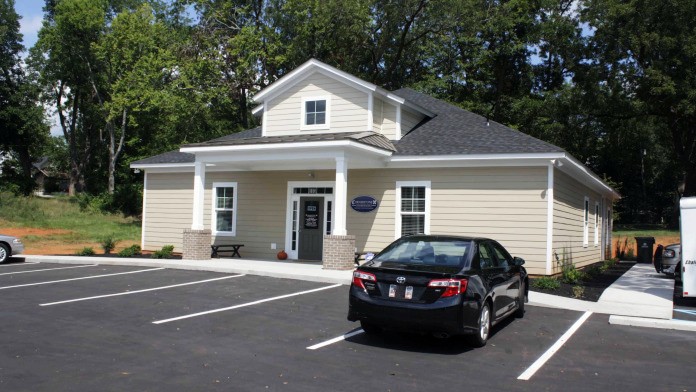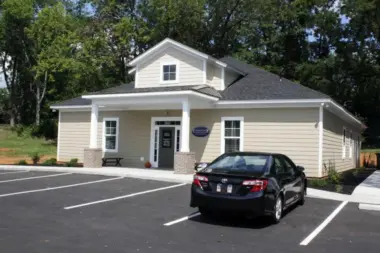About Cornerstone
Cornerstone’s Abbeville location in South Carolina is a facility that specializes in helping people with substance use disorder services and other co-occurring mental health conditions. It’s been around since 1973, and they’re located near Blue Hill Creek. They also serve populations with specific needs related to issues like trauma, criminal justice, and pregnancies involving intravenous substances.
They take walk-ins on Tuesdays and Thursdays. If you can’t make it to an appointment, you can still receive care through their telehealth service.
You can pay for your treatments at Cornerstone Abbeville using Medicaid, private health insurance, and other state or government plans for substance use programs other than Medicaid. They also accept cash and self payments. If you need some extra help paying, ask them about their payment assistance program, which we feel is a nice service.
Outpatient and Specialized Treatment Programs
They provide outpatient treatment by way of standard care and intensive care through their intensive outpatient programs (IOP). The type of treatment you’ll have is dependent on what you need. We like how their care teams assess each individual to determine the best treatment path.
They also provide specialized programs if you have substance related traffic infractions like a DUI or DWI with zero judgement. They even treat gambling addiction. All their interventions are evidence-based meaning they’ve been historically proven to help many people who’ve been exactly where you are.
Support, Counseling, and Additional Services
Other supportive services include case management in the areas of employment guidance, housing help, and integrated primary care. Their counseling services are broad to cover individuals, groups, families, or couples. If you smoke or vape, they have a great cessation intervention.
There are assessments and testing services such as drug or alcohol urine and oral fluid testing to help individuals stay accountable. They provide naloxone and overdose education. Their transitional services include discharge planning, continued care, and compassionate follow-up services to help you prevent relapse and stay successful.
Rehab Score
Gallery


Accepted Insurance
Other Forms of Payment
Medicaid is a state based program that helps lower-income individuals and families pay for healthcare. Medicaid covers addiction treatment so those enrolled can use their coverage to pay for rehab. When a program accepts Medicaid the client often pays very little or nothing out of their own pocket.
Self-pay involves paying for treatment out of your own pocket. You can use savings or credit, get a personal loan, or receive help from family and friends to fund your treatment. If you don't have insurance or your insurance plan doesn't cover a specific program, self-pay can help ensure you still get the care you need.
Financial aid can take many forms. Centers may have grants or scholarships available to clients who meet eligibility requirements. Programs that receive SAMHSA grants may have financial aid available for those who need treatment as well. Grants and scholarships can help you pai for treatment without having to repay.
Private insurance refers to any kind of healthcare coverage that isn't from the state or federal government. This includes individual and family plans offered by an employer or purchased from the Insurance Marketplace. Every plan will have different requirements and out of pocket costs so be sure to get the full details before you start treatment.
Addiction Treatments
Levels of Care
Outpatient Programs (OP) are for those seeking mental rehab or drug rehab, but who also stay at home every night. The main difference between outpatient treatment (OP) and intensive outpatient treatment (IOP) lies in the amount of hours the patient spends at the facility. Most of the time an outpatient program is designed for someone who has completed an inpatient stay and is looking to continue their growth in recovery. Outpatient is not meant to be the starting point, it is commonly referred to as aftercare.
For those persons who need more than a once-a-week group but do not need an inpatient setting, Cornerstone offers the Intensive Outpatient Program at its Greenwood location. The Intensive Outpatient Program is an evidence-based program that includes groups on Early Recovery Skills, Relapse Prevention, and Family Relationships, as well as individual counseling sessions. One advantage of this program is that participants can continue to work while in treatment. In order to accommodate various work schedules, the program offers both morning and the evening sessions.
Completing a drug or alcohol rehab program shouldn't spell the end of substance abuse treatment. Aftercare involves making a sustainable plan for recovery, including ongoing support. This can include sober living arrangements like halfway houses, career counseling, and setting a patient up with community programs like Alcoholics Anonymous (AA) or Narcotics Anonymous (NA).
Treatments
The goal of treatment for alcoholism is abstinence. Those with poor social support, poor motivation, or psychiatric disorders tend to relapse within a few years of treatment. For these people, success is measured by longer periods of abstinence, reduced use of alcohol, better health, and improved social functioning. Recovery and Maintenance are usually based on 12 step programs and AA meetings.
Choosing a drug rehab in South Carolina helps you overcome drug dependency, learn how to manage cravings, and obtain the tools needed to prevent relapse. This is accomplished through individualized treatment that addresses a full spectrum of physical, social, and emotional needs.
Many of those suffering from addiction also suffer from mental or emotional illnesses like schizophrenia, bipolar disorder, depression, or anxiety disorders. Rehab and other substance abuse facilities treating those with a dual diagnosis or co-occurring disorder administer psychiatric treatment to address the person's mental health issue in addition to drug and alcohol rehabilitation.
Substance rehabs focus on helping individuals recover from substance abuse, including alcohol and drug addiction (both illegal and prescription drugs). They often include the opportunity to engage in both individual as well as group therapy.
Programs
Adult rehab programs include therapies tailored to each client's specific needs, goals, and recovery progress. They are tailored to the specific challenges adult clients may face, including family and work pressures and commitments. From inpatient and residential treatment to various levels of outpatient services, there are many options available. Some facilities also help adults work through co-occurring conditions, like anxiety, that can accompany addiction.
Young adulthood can be an exciting, yet difficult, time of transition. Individuals in their late teens to mid-20s face unique stressors related to school, jobs, families, and social circles, which can lead to a rise in substance use. Rehab centers with dedicated young adult programs will include activities and amenities that cater to this age group, with an emphasis on specialized counseling, peer socialization, and ongoing aftercare.
Clinical Services
Whether a marriage or other committed relationship, an intimate partnership is one of the most important aspects of a person's life. Drug and alcohol addiction affects both members of a couple in deep and meaningful ways, as does rehab and recovery. Couples therapy and other couples-focused treatment programs are significant parts of exploring triggers of addiction, as well as learning how to build healthy patterns to support ongoing sobriety.
Research clearly demonstrates that recovery is far more successful and sustainable when loved ones like family members participate in rehab and substance abuse treatment. Genetic factors may be at play when it comes to drug and alcohol addiction, as well as mental health issues. Family dynamics often play a critical role in addiction triggers, and if properly educated, family members can be a strong source of support when it comes to rehabilitation.
Group therapy is any therapeutic work that happens in a group (not one-on-one). There are a number of different group therapy modalities, including support groups, experiential therapy, psycho-education, and more. Group therapy involves treatment as well as processing interaction between group members.
In individual therapy, a patient meets one-on-one with a trained psychologist or counselor. Therapy is a pivotal part of effective substance abuse treatment, as it often covers root causes of addiction, including challenges faced by the patient in their social, family, and work/school life.
The Life Skills Classes, is an evidence based program directed at middle or high school age students that helps teach them about making choices and healthy decisions in their lives. Some of the topics discusses are alcohol, tobacco, violence in the media, coping with anger and anxiety, communication skills, social skills and resolving conflicts.
Amenities
-
Residential Setting
-
Private Setting
Staff & Accreditations
Staff
Barbara
Director of Outpatient Services
Brittany
Clinical Counselor
Claudia
Clinical Counselor
Gail
Clinical Counselor
Helen
Clinical Counselor
Lara
Clinical Counselor
Lisa
Peer Support
Lori
Clinical Counselor
Accreditations

The Commission on Accreditation of Rehabilitation Facilities (CARF) is a non-profit organization that specifically accredits rehab organizations. Founded in 1966, CARF's, mission is to help service providers like rehab facilities maintain high standards of care.
CARF Accreditation: Yes
Contact Information
103 Whitehall Street
Abbeville, SC 29620



